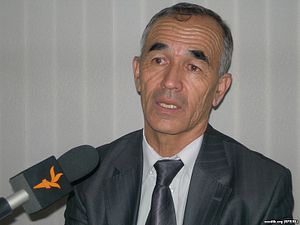A little more than a month ago, the UN Human Rights Committee called on Kyrgyzstan to immediately release jailed human rights activist Azimjan Askarov. The ruling was welcomed by human rights advocates and disparaged by nationalistic politicians. On May 30, RFE/RL’s Kyrgyz service reported that local authorities in Askarov’s home district of Jala-Abad, had moved to seize his home. The pending confiscation of Askarov’s property, which his family reportedly still occupies, is the kind of lower-level backlash common in many post-Soviet countries.
The committee’s ruling–on a complaint by Askarov first filed in 2012–touched on a series of tremendously sensitive issues stretching from the 2010 ethnic violence in southern Kyrgyzstan to torture in the penitentiary system all the way to national sovereignty. Kyrgyzstan tore up a cooperation treaty with the United States over Askarov last year. And while the committee’s April decision was met with about as much welcome as could be expected, Ainash Tokbaeva, the chairwoman of the Kygryz Supreme Court, said the court would have to revisit its 2011 decision to uphold Askarov’s conviction.
The Kyrgyz constitution permits citizens to petition international bodies to protect their rights and obligates the state to comply. This provision, after the ruling, prompted Kyrgyz President Almazbek Atambayev to tell Interfax, a Russian news agency, that parts of the Kyrgyz constitution were “undermining Kyrgyzstan’s sovereignty.”
Some analysts believe Atambayev is gearing up to propose changes to the Kyrgyz constitution, particularly to weaken the presidency, which he will be leaving in 2017. In an article a few days before the committee’s decision was published, and two weeks before Atambayev’s comments to Interfax, Eurasianet noted that “Existing legislation stipulates that Kyrgyzstan’s mixed presidential-parliamentary constitution cannot be altered until 2020. But it’s worth noting that legal provisions have not prevented the ruling elite from making revisions in the past.”
When–or rather, if–the Kyrgyz Supreme Court actually revisits Askarov’s case he will be fighting an uphill battle politically. Even if the Kyrgyz constitution mandates that the committee’s decision should force a revisiting of his case, the cadre of politicians around the president are not keen on it.
According to reporting from RFE/RL, the head of the Jalal-Abad Regional State Property Foundation Directorate said that the May 29 confiscation of Askarov’s house was in accordance with his sentence. But Bir-Duino-Kyrgyzstan, a Kyrgyz human rights group, said the house cannot be legally seized because Askarov’s family is still living there.
24.kg suggested that the directives motivating the state bodies to seize the property were set in motion in March, but the timing of the impending seizure (Askarov’s wife told RFE/RL that on on May 25, 20 officials came to take stock of the property) after the committee’s decision gives the appearance of an alternative narrative. The property seizure is either a badly-timed coincidence or falls into an established pattern in which authorities carry out alternative ways of punishing people. In many former Soviet states, authorities will target family or property of those who have–in the eyes of the elite–embarrassed the state on an international stage.
The UN Human Rights Committee demanding a new appeal for Askarov certainly qualifies.
































